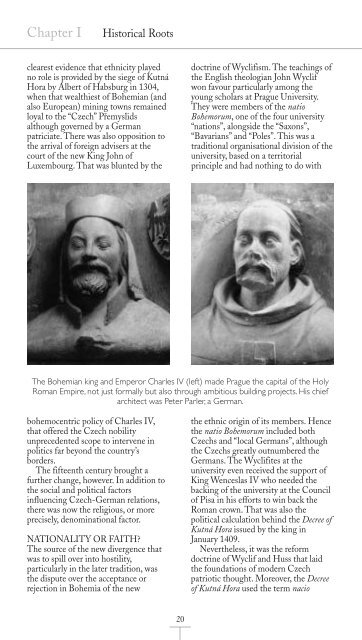the nationality of all inhabitants of the czech provinces and ...
the nationality of all inhabitants of the czech provinces and ...
the nationality of all inhabitants of the czech provinces and ...
You also want an ePaper? Increase the reach of your titles
YUMPU automatically turns print PDFs into web optimized ePapers that Google loves.
Chapter I Historical Roots<br />
clearest evidence that ethnicity played<br />
no role is provided by <strong>the</strong> siege <strong>of</strong> Kutná<br />
Hora by Albert <strong>of</strong> Habsburg in 1304,<br />
when that wealthiest <strong>of</strong> Bohemian (<strong>and</strong><br />
also European) mining towns remained<br />
loyal to <strong>the</strong> “Czech” Přemyslids<br />
although governed by a German<br />
patriciate. There was also opposition to<br />
<strong>the</strong> arrival <strong>of</strong> foreign advisers at <strong>the</strong><br />
court <strong>of</strong> <strong>the</strong> new King John <strong>of</strong><br />
Luxembourg. That was blunted by <strong>the</strong><br />
The Bohemian king <strong>and</strong> Emperor Charles IV (left) made Prague <strong>the</strong> capital <strong>of</strong> <strong>the</strong> Holy<br />
Roman Empire, not just form<strong>all</strong>y but also through ambitious building projects. His chief<br />
architect was Peter Parler, a German.<br />
bohemocentric policy <strong>of</strong> Charles IV,<br />
that <strong>of</strong>fered <strong>the</strong> Czech nobility<br />
unprecedented scope to intervene in<br />
politics far beyond <strong>the</strong> country’s<br />
borders.<br />
The fifteenth century brought a<br />
fur<strong>the</strong>r change, however. In addition to<br />
<strong>the</strong> social <strong>and</strong> political factors<br />
influencing Czech-German relations,<br />
<strong>the</strong>re was now <strong>the</strong> religious, or more<br />
precisely, denominational factor.<br />
NATIONALITY OR FAITH?<br />
The source <strong>of</strong> <strong>the</strong> new divergence that<br />
was to spill over into hostility,<br />
particularly in <strong>the</strong> later tradition, was<br />
<strong>the</strong> dispute over <strong>the</strong> acceptance or<br />
rejection in Bohemia <strong>of</strong> <strong>the</strong> new<br />
20<br />
doctrine <strong>of</strong> Wyclifism. The teachings <strong>of</strong><br />
<strong>the</strong> English <strong>the</strong>ologian John Wyclif<br />
won favour particularly among <strong>the</strong><br />
young scholars at Prague University.<br />
They were members <strong>of</strong> <strong>the</strong> natio<br />
Bohemorum, one <strong>of</strong> <strong>the</strong> four university<br />
“nations”, alongside <strong>the</strong> “Saxons”,<br />
“Bavarians” <strong>and</strong> “Poles”. This was a<br />
traditional organisational division <strong>of</strong> <strong>the</strong><br />
university, based on a territorial<br />
principle <strong>and</strong> had nothing to do with<br />
<strong>the</strong> ethnic origin <strong>of</strong> its members. Hence<br />
<strong>the</strong> natio Bohemorum included both<br />
Czechs <strong>and</strong> “local Germans”, although<br />
<strong>the</strong> Czechs greatly outnumbered <strong>the</strong><br />
Germans. The Wyclifites at <strong>the</strong><br />
university even received <strong>the</strong> support <strong>of</strong><br />
King Wenceslas IV who needed <strong>the</strong><br />
backing <strong>of</strong> <strong>the</strong> university at <strong>the</strong> Council<br />
<strong>of</strong> Pisa in his efforts to win back <strong>the</strong><br />
Roman crown. That was also <strong>the</strong><br />
political calculation behind <strong>the</strong> Decree <strong>of</strong><br />
Kutná Hora issued by <strong>the</strong> king in<br />
January 1409.<br />
Never<strong>the</strong>less, it was <strong>the</strong> reform<br />
doctrine <strong>of</strong> Wyclif <strong>and</strong> Huss that laid<br />
<strong>the</strong> foundations <strong>of</strong> modern Czech<br />
patriotic thought. Moreover, <strong>the</strong> Decree<br />
<strong>of</strong> Kutná Hora used <strong>the</strong> term nacio


